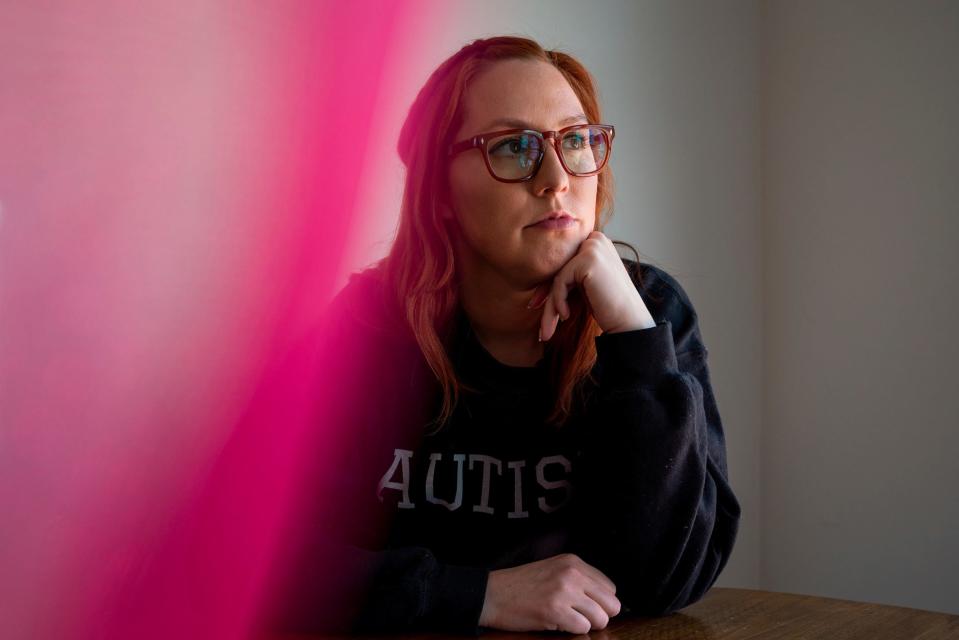Adults and autism spectrum disorder: What you should know
About 2% of the world's adults have autism spectrum disorder.
And many people recently have come to the realization that they're autistic as adults, some sharing their stories about their diagnosis or even self-diagnosis on TikTok.
"Social media has been a driving factor for many people," said Toby Kellk, a psychologist in Huntington Woods who evaluates people for autism spectrum disorder, among other conditions. "I don't think that's the factor for all people. But I do think, especially some of the individuals that are in their 20s or 30s, have more of a strong connection to the neurodiverse community."

While Centers for Disease Control and Prevention data shows that more men than women are estimated to have autism spectrum disorder, a growing number of women are coming forward with their own stories, sharing that they've been overlooked in depictions of autism, particularly stereotypical media that shows young, nonspeaking boys.
What is autism spectrum disorder?
Autism spectrum disorder is a neurological and developmental condition, according to the National Institute of Mental Health. It affects how people interact, learn, communicate and behave. The "spectrum" part of autism spectrum disorder is important, because autism looks different depending on the individual.
What are signs of autism spectrum disorder?
According to the CDC and the Mayo Clinic, signs of ASD include:
Trouble with making eye contact.
Difficulty interacting and socializing with others.
Difficulty expressing emotions and understanding another person's emotions.
Difficulty understanding social cues, missing tone of voice or subtext in a conversation.
Performing repetitive moments, like hand-flapping or rocking back and forth.
Sensory issues, which might include sensitivity to certain stimuli, such as lights, sounds and textures.
Signs can differ from person to person, and showing multiple signs does not necessarily mean someone has the condition. Dr. Tisa Johnson-Hooper, medical director for the Center for Autism and Developmental Disabilities at Henry Ford Health, said that some indicators may point to other conditions.
"There are many symptoms that people who have autism have, but those symptoms can be shared with other diagnoses," she said. "Diagnoses like anxiety disorder, social phobia, depression, these are diagnoses that share symptoms."
What is the significance of a diagnosis?
Some people in autism communities prefer to identify as self-diagnosed. Diagnoses, particularly in adulthood, can cost significant time and money, and some clinicians limit evaluations to children and younger people.
But self-diagnosis can be fruitful for some people, Kellk said, because it may help them understand something that they didn't know before.
"I think it really just depends on the person and what it might mean to them, just like any other therapeutic relationship," she said.
Johnson-Hooper urges a diagnosis.
"By self-diagnosing, you're missing the opportunity to be not just accurately diagnosed, but given targeted, evidence-based, specific intervention so that person potentially can be their best person," she said.
But she acknowledged that adults can face barriers in finding a diagnosis, with limited providers. Johnson-Hooper recommends adults start with their primary care physician or a psychiatrist.
'Autistic' or 'person with autism'?
How to refer to someone with autism spectrum disorder is an ongoing debate. Some prefer to be called autistic while others prefer what's called "person-first language," which would refer to someone as a "person with autism." The National Center on Disability and Journalism recommends asking people their preference. In profiling 10 autistic individuals, many told the Detroit Free Press that they preferred being called autistic.
Other times, adults with autism are labeled high-functioning or low-functioning. But those labels are offensive to many.
"It's really unfair to label a person as one thing or another," Leah Wathen, a 23-year-old autistic individual in Kalamazoo, said. "Because if you label someone as high functioning, then they're not allowed to mess up, they're not allowed to have those bad days where they need a lot of support ... but if you label someone as low functioning, it's also depriving them of their autonomy."
Teraysa Noyes, 33, of Grosse Pointe Park, who was diagnosed as an adult, said she prefers terms like "high support needs" or "low support needs."
"Autistic people are really, really capable," she said. "When ... support needs are met, we will really surprise a lot of people who don't necessarily think so highly of us."
Contact Lily Altavena: laltavena@freepress.com.
This article originally appeared on Detroit Free Press: Adults and autism spectrum disorder: What you should know

